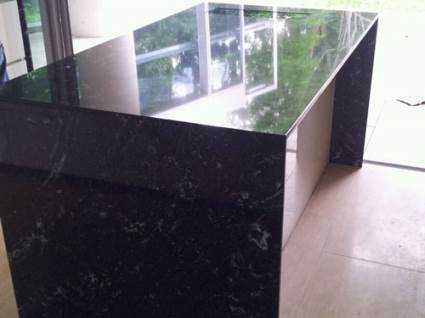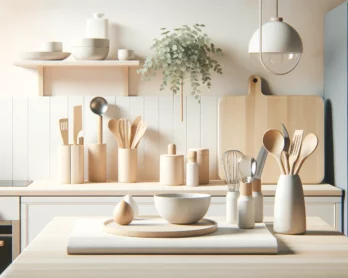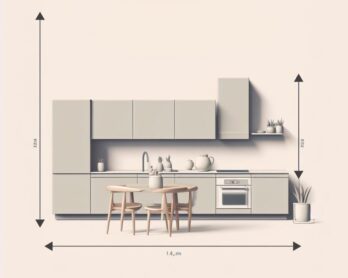If you’re in the process of designing a new kitchen, you’ve probably come across this question; should you get concrete or granite countertops? In order to find an answer to this question, we’ve created this article. We take a look at some of the advantages and disadvantage of both materials and at the end we try to pick a winner.
Customization
One of the biggest advantages of concrete countertops is the wide variety of colors to choose from. The material can be tinted any color you want. This is perfect for people who want to create a unique look. You can basically do anything with it. Mixing pigments and other materials (for example broken glass) into the concrete can create a one-of-a-kind look.
When it comes to colors, the options for granite are rather limited. Don’t get me wrong; there are plenty of colors to choose from, but concrete has more possibilities.
Since concrete is poured into a mold as a fluid, it can take on any shape you want. That’s why a lot of kitchen designers like to work with this material. Granite is a bit more limiting when it comes to custom shapes.
Durability
Every cook is worried about scratches. In terms of strength and durability, there’s no clear winner. Both materials should be strong enough to handle whatever culinary activities you can throw at them. But as always it’s best to be careful.
When it comes to maintenance, granite might be the better choice. Concrete is porous so it tends to be more susceptible to staining than granite. That’s why this material will probably need to be resealed more often than granite.
Price
The true cost of a concrete countertop is not in the material itself, but rather in the time for creating unique shapes, designs, transportation, and installation. Granite, on the other hand, isn’t know as a cheap material either. Both materials are going to run anywhere from $50 to $250 per square foot installed. In the end, it’s all about your personal needs.
Concrete countertops pros & cons
Pros of Concrete Countertops
When it comes to making the decision between two types of countertops, it is important to weigh the pros and cons of each. Here are the advantages of opting for concrete countertops:
-
Durability: Concrete is one of the most durable materials available for countertops. It is heat resistant, scratch-resistant, and stain-resistant. Concrete is also not susceptible to water damage like other materials, such as wood making it optimal for buyers on the lookout for a long-lasting investment.
-
Unique Look: No two concrete countertops are alike. This is because each one is handcrafted and can be customized to the buyer’s specifications. This means that your countertop will be truly unique, adding personality and character to your kitchen or bathroom.
-
Affordability: Although the initial cost of concrete may be higher than other materials, it will last much longer, meaning you won’t have to replace it as often. In the long run, concrete is a more cost-effective option.
-
Easy Maintenance: Concrete countertops are easy to clean and require little maintenance. Simply wiping them down with a damp cloth is usually all that is needed to keep them looking like new.
Cons of Concrete Countertops
While this material offers many advantages, there are a few disadvantages to concrete countertops that should be considered before making a decision:
-
Weight: Concrete is a heavy material, making it difficult to install for some homeowners. It is important to make sure your cabinets are strong enough to support the weight of the concrete before proceeding with installation.
-
Possible Staining: Although concrete is stain-resistant, it is not entirely impervious to staining. If a spill is not cleaned up quickly, it can leave a permanent mark. This means you need to be careful when using concrete countertops, and always clean up spills right away.
-
High Initial Cost: The initial cost of concrete countertops can be higher than other materials. However, as mentioned above, they will last longer, so you may end up saving money in the long run.
Granite countertops pros & cons
Pros of Granite Countertops
Similar to concrete, granite is a durable material that offers a number of benefits making it one of the most popular countertop materials for homeowners. Here are just a few of the pros of granite countertops:
-
Heat Resistance: Granite is heat resistant, making it a good choice for kitchens where cooking is often done. Other countertops, such as laminate, can be damaged by heat, making granite a more durable option.
-
Stain Resistance: Granite is also resistant to staining, meaning you don’t have to worry about spills ruining your countertop. This also means it requires less maintenance, as you won’t have to worry about scrubbing it as often.
-
Unique Look: Like concrete, granite is unique in that no two pieces are exactly alike. This natural beauty can add value to your home and make your kitchen or bathroom stand out.
-
Large Range of Colours: Granite comes in a wide range of colours, so you are sure to find one that compliments your décor. Whether you are looking for a classic look or something more unique, granite has you covered.
Cons of Granite Countertops
There are also a few disadvantages to granite countertops that should be considered before making your final decision:
-
Cost: Granite can be one of the more expensive countertop materials available. However, it is worth noting that it is a long-lasting investment that will likely increase the value of your home.
-
Installation: Installing granite countertops can be difficult and time-consuming. It is important to make sure you have the proper tools and expertise before attempting to install them yourself.
-
Weight: Like concrete, granite is a heavy material, making it difficult to install for some homeowners. It is important to make sure your cabinets are strong enough to support the weight of the granite before proceeding with the installation.
Concrete vs Granite: What is More in Style?
When making home renovations (or first-time installations), you want to ensure that your home not only looks good to you but that it also matches current trends in home design. Thankfully, both concrete and granite countertops are very popular choices that are sure to add value to your home.
When it comes to which is more in style, it really depends on your personal taste and the overall look you are going for in your kitchen or bathroom. If you want a classic look, then granite may be the better choice. However, if you are looking for something unique and modern, then concrete may be the way to go. Ultimately, the decision comes down to what you think looks best in your home.
Concrete vs Granite: What is Easier to Install?
While both concrete and granite countertops have their own unique advantages, one thing that they do share is that they can both be difficult to install.
Concrete is a heavy material, making it challenging to transport and install for some homeowners. Additionally, the curing process can be time-consuming, so it is important to plan a head if you are installing concrete countertops yourself.
Granite is also a heavy material, so it is important to make sure your cabinets are strong enough to support the weight before proceeding with installation. Additionally, granite countertops need to be sealed in order to prevent staining, which is an extra step that needs to be considered.
Overall, neither concrete nor granite countertops are particularly easy to install. However, granite may be slightly easier due to the fact that it does not need to cure like concrete does.
Concrete vs Granite: Which is the Better Investment?
When it comes to home renovations, you want to make sure that you are making a good investment that will add value to your home. Both concrete and granite countertops can be costly, but they are also long-lasting investments that will likely increase the value of your home.
Additionally, both concrete and granite are popular choices that are sure to appeal to potential buyers if you ever decide to sell your home. So, if you are looking for a material that is both stylish and a good investment, then either concrete or granite would be a good choice. However, from a better bang for your buck standpoint, granite may be a slightly better investment as it is less likely to crack or chip than concrete and could last you longer in the long run.
Concrete countertop examples
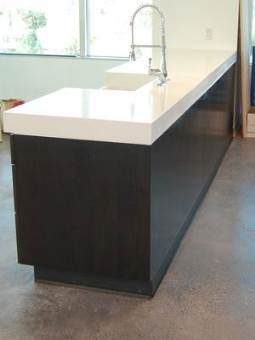
This white concrete countertop was made using GFRC (Glass Fiber Reinforced Concrete) for a lighter, more durable countertop.
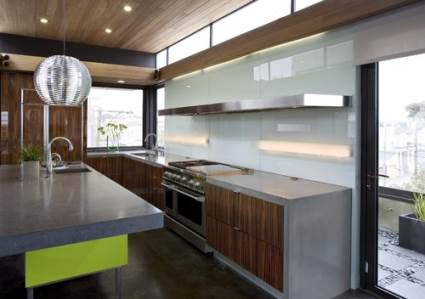
This modern kitchen has a blue glass backsplash with concrete countertops:
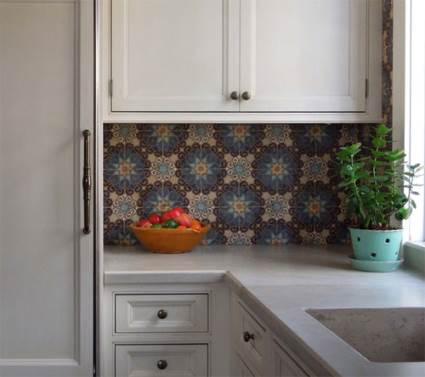
Another great example of a concrete countertop. Check out those beautiful Maroccan tiles!
Granite countertop examples
Other materials
Besides granite and concrete, there are plenty of other materials to choose from.
Acrylic and polyester countertops can also look great in modern kitchens. Because this material is nonporous, it’s virtually maintenance free. Color and pattern options are extensive, and the seamless installation means there are no cracks to trap dirt.
Quartz is also a viable option. This material is a good compromise between the beauty of stone and the easy care of solid surfaces. Quartz is also available in a far greater range of colors than natural stone.
If you want a more glamorous look, you can try marble. Marble stands up to heat pretty well and because it remains perennially cool it’s a great choice for pastry and baking stations. The problem of this material is that it’s susceptible to stains.
Tiles are a versatile material for countertops, because there are thousands of colors and designs to choose from. If one or two tiles chip or crack, they’re fairly easy (and cheap) to replace.
Stainless steel countertops are mostly used in commercial kitchens, but have found their way into our homes. This material is nearly indestructible and it resists heat and bacteria. Stainless steel also provides a very distinctive look that’s perfect for modern kitchens.


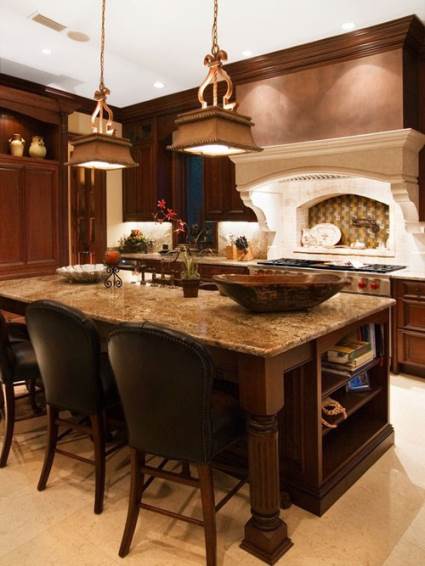 This granite counterop really fits the color palette of this beautiful kitchen
This granite counterop really fits the color palette of this beautiful kitchen A beautiful granite countertop in this kitchen by Rooftight
A beautiful granite countertop in this kitchen by Rooftight